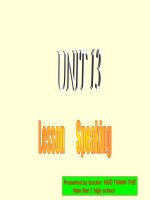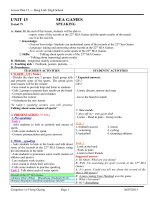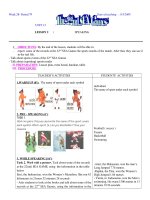unit 13 speaking eng10
Bạn đang xem bản rút gọn của tài liệu. Xem và tải ngay bản đầy đủ của tài liệu tại đây (208.89 KB, 7 trang )
ENGLISH 10
UNIT 13: FILMS AND CINEMA
SPEAKING SKILL
LESSON OUTLINE
I.
II.
III.
IV.
V.
Warm up:
- Activity 1: Guessing the names of movies
- Activity 2: Lead in
Pre – speaking
- Teaching vocabulary
While – speaking:
- Activity 1: Arrange the given words to make meaningful sentences
- Activity 2: Make a conversation
- Activity 3: Make a conversation
Post – speaking
- Discussion: Talk about a film you have seen
Homework:
UNIT 13: FILMS AND CINEMA
Speaking skill
I. Objectives:
By the end of the lesson, students will be able to:
•
Know more about many kinds of films and adjectives about feelings
•
Improve their speaking skill through discussion, survey…
II. Method:
-
Integrated, mainly communicative.
III. Teaching aids:
- Projector, handouts, chalks, textbook, poster, and magnets.
IV. Procedure:
Time
2’
5’
7’
Content
Activities
I.
II.
Class stabilization
Check – up
III. Warm – up
Activity 1: Guessing the names of
movies
• Rules of the games:
- Watch 6 film trailers
- Guess the names and kinds of these
films.
- The group having the answer will
raise hands and speak out loud it.
- The group having more correct
answers will be the winner.
• Answers:
1. Titanic – Love story film
2. Quá nhanh quá nguy hiểm 7 (Fast and
Furious 7) – Action film
3. Công phu Gấu Trúc (Kung fu Panda) –
Cartoon film
- T divides class into 4
groups.
- T gives instruction.
- T shows trailers.
- T declares the winner.
4.
Sherlock Homles – ( Thám tử Sherlock
Holmes) – Detective film
5. Chuyến tàu sinh tử (Train to Busan) –
Horror film
6. Hai Phượng – Thriller film
Activity 2: Lead in
- T introduces the lesson.
T introduces the topic for the lesson:
“Today, to know more about some
kinds of films, we will learn unit 13:
Films and Cinema – Lesson 2:
Speaking
10’
III.
Pre – speaking
Activity 1: Teaching vocabulary
1. Science fiction (n) /ˌsaɪəns ˈfɪkʃn/: khoa học
viễn tưởng
• Expected answer : C. science fiction
2. Horror (adj) /'hɔrə/: ly kỳ, rùng rợn, kinh dị
(n) sự ghê rợn, điều khủng khiếp, cảnh khủng
khiếp
Expected answer : Horror
3. Detective (n) /dɪˈtektɪv/: thám tử trinh thám
(adj): đê do ra, đê khám phá, phát hi ên ra; trinh
1. T asks: “I saw robots and
many amazing things in
the future when I watch
__________ films. Choose
a suitable answer
a. cartoon
b. love story
c. science fiction
2. T shows a picture and asks
“ This is a ___________
movie”
3. T shows a picture and asks
“what is he doing?”
thám
4. T asks: “How do you say
“truyên/phim giât gân, ly
ky” in English?”)
4. Thriller (n) /ˈθrɪlə(r)/: truyên (kịch, phim) giât
gân, ly kỳ
(T asks: “How do you say “truyên/phim giât gân,
ly ky” in English?”)
5. T shows a film excerpt and
asks “How do you feel?”
5. Moving (adj) /ˈmuːvɪŋ/: cảm đông, thương
tâm
6. T asks: “What is the
Film: “ Ngôi mộ đom đóm”
Expected answer : moving
6. Violent (adj) /ˈvaɪələnt/: dư dôi, hung bao
Expected answer : Violent
- T has some ss read all the
• Vocabulary :
1. Science fiction (n) /ˌsaɪəns ˈfɪkʃn/: khoa học
2.
3.
4.
5.
viễn tưởng
Thriller (n) /ˈθrɪlə(r)/: truyên (kich, phim)
giât gân, ly ky
. Horror (adj) /'hɔrə/: ly ky, rùng rợn, kinh
di
Detective (n) /dɪˈtektɪv/: thám tử trinh
thám
Moving (adj) /ˈmuːvɪŋ/: cam đông, thương
tâm
6. Violent (adj) /ˈvaɪələnt/: dư dôi, hung bao
opposite of “gentle”?
words and corrects ss’
pronunciation if necessary.
12’
IV.
While – speaking
Activity 1 : Arrange the given words
to make meaningful sentences
Handout :
1. Do / like/ you/ watching/ films?
2. Kind / do/ like/ What/ of/ films/ you?
3. Like/ do/you/what/it?
4. How often /you/ do/ films/ watch?
5. How/ feel/do/you/ see/ it/ when?
• Answer key:
1.
Do/ like/ you/ watching/ films?
Do you like watching films?
2.
kind/ do/ like/ What/ of/ films/ you?
What kind of films do you like?
3.
like/ do/ you/ it/ Why?
Why do you like it?
4.
How often/ you/ do/ films/ watch?
How often do you watch films?
5. How/ feel/do/you/ see/ it/ when?
How do you feel when you see it?
Activity 2: Make a conversation
• Questions in handout:
1. Do you like watching films?
2.
3.
4.
5.
Yes, I do/ No, I don’t.
What kind of films do you like?
I like/ love cartoon films/ romantic films.
My favorite kind of film is…..
I like ______ best.
Why do you like it?
Since/ because/ as…
How often do you watch films?
I watch films every day/ twice a week/…
How do you feel when you see it?
I find it interesting/ relaxing/ moving/
funny/ violent/ boring/ exciting.
- T gives handouts to Ss
- T gives instruction:
“Work in pairs in 3 minutes to
arrange the given words to make
meaningful sentences”
- T offers a representative
from each pair to give their
answers
- T gives feedbacks and
correction
- T gives instruction:
“Work in pairs in 3 minutes and
use the questions in Activity 1 to
make a conversation.”
- T shows model answers
and explains.
Activity 3: Make a conversation.
Ex: A: Which do you prefer, cartoon films or
science fiction films?
B: Well, it’s difficult to say. But I suppose I
prefer science fiction films to cartoon ones.
7’
V.
1.
2.
3.
4.
Post – speaking
Discussion :Talk about a film you
have seen
• Suggested questions to answer:
Where did you see it?
What kind of film is it?
Who is/are the main character(s)?
How do you feel about it?”
VI. Homework
- Learn vocabulary
- Practice to make a conversation about kind
of films using adjectives to express feelings.
- Prepare the next lesson.
- T shows a sample dialogue
and asks Ss to base on it
and kinds of films Ss have
just learned to make their
own conversation.
- T asks Ss to work in pairs in
3 minutes.
- T invites some pairs to go
to the board and make
conversation.
- T gives feedbacks.
- T gives posters to Ss
- T gives instruction:
“You will work in groups. During 5
minutes, your group will discuss
and present about a film you
have seen on the poster
- T models the activity
- T lets Ss do the task
- T goes around to observe
- T invites 3 representatives
of 3 groups to share their
ideas
- T gives feedbacks and
indirect correction
- T asks ss to learn
vocabulary, practice to
make a conversation about
kind of films using
adjectives to express
feelings and prepare the
next lesson.









